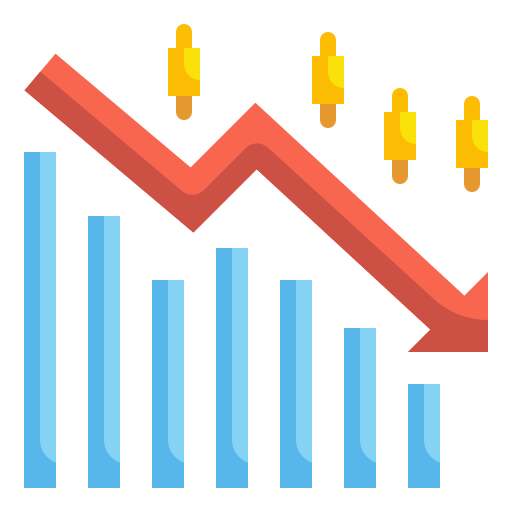
Title: An Introduction to Stock Market | Know the basics of Stock Market
Are you intrigued by the Stock Markets? Do you find trading terms confusing? Are you looking to make extra money through the Stock Markets?
Every year, many people dive into the Stock Markets with hopes of achieving financial independence and making steady profits.
But did you know that 90% of these traders end up failing miserably. Do you know why?
The reason behind this is often a lack of knowledge and essential skills.
If you’re a beginner eager to join the Stock Market, or if you’ve already taken the plunge, then this blog is perfect for you.
Let’s start by understanding…
What Is A Stock Market?

The stock market is like a big market where people and companies can trade shares of ownership in public companies.
Here’s how it works: Companies can sell shares of their company to investors to raise money. Then, investors can trade these shares with each other. They might do this to try and make money if the share prices go up, or they might get paid dividends based on how well the company is doing.
The stock market is really important because it helps businesses get money to grow, gives investors a way to invest their money, and shows how the economy is doing overall.
What Is A Stock Market Exchange?
A stock market exchange is like a big marketplace where people can buy and sell different kinds of investments, like stocks and bonds. These exchanges are important because they provide a safe and fair place for trading. The prices of investments are decided by how much people want to buy or sell them.
These exchanges help connect people who want to invest money with companies that need money to grow. Companies can sell shares of their business to the public, and investors can buy or sell these shares whenever they want. This helps keep the market moving smoothly and makes sure money is used wisely.
Some famous stock market exchanges include the National Stock Exchange, Bombay Stock Exchange, New York Stock Exchange, NASDAQ, London Stock Exchange, Tokyo Stock Exchange, and Hong Kong Stock Exchange. Each one works a little differently, but they all help people invest in companies and grow their money.
What Is A Stock Market Index?
A stock market index is like a report card for a group of stocks that represent a specific market or industry. It helps us understand how well that market or industry is doing overall. These indexes are important because they give us a way to compare the performance of different stocks or investment funds.
To create a stock market index, we take the average of the prices of all the stocks in that group. Each stock’s importance in the index is based on things like its size in the market or how much money it makes. There are many different indexes that track different parts of the stock market.
For example, in India, we have several important indexes:
- NSE Nifty: This index tracks 50 big companies from different industries listed on the National Stock Exchange (NSE).
- NSE Bank Nifty: It focuses specifically on banking stocks, including the biggest and most active ones on the NSE.
- BSE Sensex: This index follows 30 of the largest and most traded stocks on the Bombay Stock Exchange (BSE).
- BSE Small Cap Index: It includes almost 1000 smaller companies from the BSE, giving us an idea of how well these smaller businesses are doing.
- BSE Mid Cap Index: This index looks at 125 medium-sized companies from the BSE, showing us how they’re performing.
Investors, fund managers, and analysts use these indexes to keep track of how the Indian stock market is doing and to help them decide where to invest their money. They also use them as a way to measure how well individual stocks or investment funds are doing compared to the overall market.
What Are The Two Major Indices In The Stock Market?
In the Indian stock market, there are two main indices:
- BSE Sensex: The BSE Sensex, also known as the Bombay Stock Exchange Sensitive Index, is the oldest and most popular stock market index in India. It includes 30 of the biggest and most actively traded stocks on the Bombay Stock Exchange (BSE). The Sensex is calculated based on the market value of these stocks, considering how freely they can be bought and sold. It’s seen as a key indicator of the overall performance of the Indian stock market.
- NSE Nifty: The NSE Nifty, also called the National Stock Exchange Fifty, is the primary index of the National Stock Exchange (NSE). It consists of 50 large-cap stocks from various sectors, offering a broader representation of the market compared to the Sensex. The Nifty’s calculation takes into account the market capitalization of its constituent stocks, adjusting for the portion of shares available for trading. Many investors and fund managers use the Nifty to monitor the performance of the Indian stock market.
Understanding Stock Market Terms: Common Words You Need to Know
What Is A Long Position?

In simple terms, a long position in the stock market means buying an asset like a stock, bond, or commodity, with the hope that its value will go up over time. This is like making a bet that the price of the asset will increase.
When someone takes a long position, they plan to hold onto the asset for a while. They might sell it later when they think its value has gone up, making a profit by selling it for more than they paid for it.
This strategy, called taking a long position, is a common way of investing. People of all kinds, like individual investors, big institutions, and traders, use this strategy.
What Is A Short Position?

Short selling in the stock market is a strategy where investors or traders sell an asset, like a stock or commodity, with the expectation that its value will drop in the future. This means they’re betting on the asset’s price to go down.
Here’s how it works: When someone shorts a position, they borrow the asset and sell it on the market. Later, they buy it back at a lower price and return it to the lender. If the price has indeed fallen, they make a profit from the price difference between the sale and purchase.
While short selling can be a way to profit from falling prices, it’s considered riskier than buying and holding stocks. That’s because if the price goes up instead of down, the losses can be substantial.
Types Of Traders In The Stock Market
In the stock market, there are various types of traders, each with their own unique characteristics and strategies. Here’s a breakdown of the most common types:
- Day Traders: These traders buy and sell securities within the same day, capitalizing on short-term price movements. They typically close out all their positions by the end of the trading day and avoid holding overnight.
- Swing Traders: Swing traders hold positions for a few days to a few weeks, aiming to profit from medium-term price changes. They rely on technical analysis and market trends to identify entry and exit points.
- Positional Traders: Positional traders hold positions for several months to several years, seeking to profit from long-term market trends. They use fundamental analysis and macroeconomic factors to make investment decisions.
- Scalpers: Scalpers are day traders who aim to profit from small price movements by executing numerous trades throughout the day. They often use high-frequency trading algorithms for quick entry and exit.
- Algorithmic Traders: Algorithmic traders use computer programs to automatically execute trades based on predefined criteria, such as technical indicators or news events. They can execute trades faster and more efficiently than human traders.
- High-Frequency Traders: High-frequency traders use advanced algorithms and powerful computers to make trades at lightning-fast speeds, often holding positions for just a few seconds. They seek to profit from small price discrepancies between different markets or exchanges.
Each type of trader has its own strengths and weaknesses. Understanding the different trading styles can help investors make informed decisions in the stock market.
How To Start Trading In India?
If you’re ready to dive into trading in India, here’s a simple guide to get you started:
- Open a trading account: First things first, you’ll need to open a trading account with a brokerage firm that’s registered with the Securities and Exchange Board of India (SEBI). This account will be your gateway to the stock market.
- Choose a trading platform: Next, decide whether you want to use a traditional broker-assisted platform or an online trading platform. Nowadays, online platforms like Zerodha, Sharekhan, Fyers, and Upstox are quite popular due to their convenience, lower brokerage charges, and real-time market access.
- Fund your trading account: Once your account is set up, you’ll need to fund it with money to start trading. You can do this easily through online banking, debit/credit card, or by depositing a check.
- Learn about trading: Before you jump into trading, take some time to learn the basics. Understand how to read stock charts, analyze financial statements, and develop a trading strategy. There are plenty of online resources, courses, and books available to help you get started.
- Start Trading: When you’re confident in your understanding of trading, you can begin buying and selling stocks on the stock market. Keep an eye on your trades: Make sure to regularly check how your trades are doing and tweak your trading strategy if necessary.
Remember, trading involves risks, so it’s essential to educate yourself and proceed with caution. With the right knowledge and strategy, you can navigate the stock market successfully and potentially grow your wealth over time.
Conclusion
In summary, learning about the stock market basics is key for smart investing. When you understand how it operates, you can make better choices about when to buy or sell stocks and how to handle risks in your investment mix. While there’s no guaranteed formula for stock market success, having a strong grasp of the basics is crucial for making wise investment moves in the long run. Armed with this knowledge, investors can confidently sail through the ups and downs of the stock market and reach their financial goals.
Welcome to StockLogicks – Where Trading Becomes Simple and Profitable!
Trading can seem overwhelming with all its complexities, but here at STOCKLOGICKS, we’re here to simplify it for you. Our courses cover everything you need to know about trading, breaking it down step by step for a less risky and more effective approach.
We understand that trading is often seen as risky, but we believe that with the right knowledge, anyone can trade like a pro and stay ahead of the risks. That’s why we’re dedicated to providing you with full knowledge and guidance to navigate the stock market successfully.
Join our course today to unlock the secrets of trading and start booking big profits. Share your thoughts on the stock market in the comments below!
And if you’re interested in learning more about Risk Management & Intraday Trading Strategies, be sure to check out our previous blog posts on the topic.
Ready to get started? Open a Demat Account using our link (https://stocklogicks.com/demat-account/) and send your ID to demat@stocklogicks.com for personalized support from our team. Let’s make trading simple and profitable together!





One thought on “Unlocking the Stock Market: Your Guide to Understanding the Basics #1”